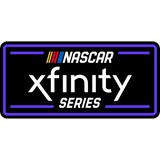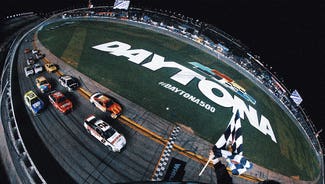
NASCAR could see long-term impacts from LGBCoin decision
By Bob Pockrass
FOX Sports NASCAR Writer
NASCAR’s decision to reject a proposed sponsorship for Xfinity Series driver Brandon Brown might be a short-term firestorm with long-term implications.
The sanctioning body has considered a shift in policy to restrict sponsorships that it believes are political in nature as it strives to be as least divisive as possible. While NASCAR has had its share of sponsor controversies and conflicts in the past, a shift to potentially not approving sponsorships if they are political in nature could be more difficult to navigate.
"It gets to be a very sticky wicket for everybody," said former Texas Motor Speedway President Eddie Gossage, who was in the middle of the sponsorship debate when the National Rifle Association sponsored a race at his track.
"That’s where it gets to be difficult for NASCAR or a league to say, ‘These things we don’t allow’ because there are certain things that don’t certainly fall in there, and it becomes a judgment call — and then the sanctioning body or the league gets accused of taking a political position."
Brown inadvertently became a political figure when he won the Xfinity race in October at Talladega. As he was doing his winner’s interview on television, fans started a derisive chant directed at President Joe Biden. When the reporter erroneously mentioned that fans were cheering "Let’s Go, Brandon," many adopted the saying as a euphemism for criticism of the president.
Attempting to capitalize on the notoriety of the slogan, Brown landed a deal with the cryptocurrency LGBcoin, a collectible meme coin associated with the chant. Brown’s team received approval from a racing operations employee for its sponsor and paint scheme on Dec. 26, but NASCAR indicated that sponsorship needed approval from higher-ranking officials.
On Tuesday, NASCAR announced its decision to not approve the sponsorship.
The situation has turned into a polarizing story with lots of chatter about whether the sponsorship was approved and then NASCAR backtracked, or whether Brown’s team should have known that NASCAR senior management wouldn’t approve the sponsorship based on a meeting with the team in November. The largest investor into LGBcoin is threatening a lawsuit, citing damages to those who invested in the cryptocurrency, the value of which dropped in the hours after NASCAR’s decision.
NASCAR would not comment on the reasons for the decision on the LGBcoin sponsorship, beyond confirming that the sponsorship was not approved. Whether there will be plans for Brown to do a personal services deal to make appearances for the cryptocurrency is still being determined; NASCAR’s decision is specific to the sponsorship while at the race track for NASCAR events.
"We are disappointed that NASCAR leadership has chosen to rescind approval of this sponsorship and feel they should have the confidence to own their decision to backtrack and not gaslight a team or a driver," Brown team spokesman Max Marcucci said.
"Like every team, we rely on productive and friendly working relationships at all levels of NASCAR. Unfortunately, NASCAR leadership’s handling of this situation now threatens to strain our relationships and places us in an incredibly awkward position, yet again."
The NASCAR rule book is quite open-ended and somewhat vague when it comes to its policies.
The rule book states: "NASCAR may refuse to permit a Competitor to participate in an Event if NASCAR determines that any advertising, sponsorship, or similar agreement to which the Competitor is or will be a party, is detrimental to the sport, to NASCAR, Series Sponsor, or to the Promoter for any reason, including without limitation, the public image of the sport."
That wording gives NASCAR much leeway — and doesn't necessarily provide much guidance to potential sponsors who might be coming into the sport for the first time. While NASCAR often communicates policies to teams when it comes to various sponsorships (for instance, CBD sponsorships have to be in accordance with federal guidelines of CBD being legal if it contains less than 0.3% THC), NASCAR could update that wording to be clearer about certain standards.
"NASCAR has to have a limitation at some juncture," said Ramsey Poston, a former NASCAR spokesman who operates the Tuckahoe Strategies consulting firm. "Where that line is drawn is going to be the tricky part.
"The easy cases, something that is clearly seen as hate speech as a sponsor, is an easy ‘no.’ The hard part for NASCAR is just about anything can be considered political."
NASCAR is no stranger to controversy surrounding sponsorships and lawsuits from its decisions, so the threat of legal action likely isn’t going to sway the top brass. AT&T sued NASCAR in 2007 after it barred AT&T's sponsorship for Richard Childress Racing’s team because it violated the agreement with series sponsor Sprint. The lawsuit was eventually settled after AT&T acquired a preliminary injunction that was overturned on appeal.
NASCAR also is no stranger to ruling on sponsorships that weren’t in conflict with series sponsors. It didn’t allow hard liquors until 2005. At one point, it didn’t allow casinos that weren’t linked to a hotel. Any gas company that competes with the gas supplier of NASCAR cannot be the focus of a sponsorship; for instance, the Shell Pennzoil paint scheme must have one-third of its logo as Shell and two-thirds of its logo as Pennzoil.
"Traditionally, the way NASCAR will look at any one situation is not just how that one particular issue will affect the sport but the precedent it sets, and NASCAR considers what could evolve from this and what would be the next iteration of this if we don’t take action," Poston said.
Part of the concern has been whether a sponsorship will be an issue for the network broadcasting the race — NASCAR indicated that it did not consult the networks on the LGBcoin decision — but NASCAR also knows its brand integrity and image are at stake.
NASCAR typically has been reluctant to reject sponsors, knowing that the majority of team revenue comes from sponsorship, not the purse. That is much different than in other sports.
"NASCAR, they’re in a tough dilemma because they want their teams to have the funding to compete," Gossage said. "But they also know that they’ve got to be smart about what they allow to be involved in the sport.
"Whether the issue is on the left or the right, they’re going to offend and potentially cause difficulty to a team’s ability to continue to operate."
That philosophy hasn’t come without criticism. It has allowed political action committees and campaigns to fund sponsorships to promote candidates for office. It allowed the NRA to sponsor races and be on cars. (Team owner Richard Childress was once a vice president of the organization.)
NASCAR’s decision this week shows that LGB — the sponsor would argue that is different than spelling out "Let’s Go, Brandon" — crossed its line. But where is the line? And where will it go? If there are no political sponsorships, what is considered political?
Chris Lencheski, chairman of the sports acquisition and marketing advisory firm Phoenicia Sport and Entertainment, who has owned an Xfinity team and handled General Motors Racing marketing efforts through SKI & Company, said NASCAR’s obligation is to set definitive standards and practices for sponsors of teams. He said it is important that teams and potential sponsors coming into the sport know those standards, noting that the emerging cryptocurrency sponsorship sector should not be impacted by a decision made on a cryptocurrency that had a political undertone.
"How far should NASCAR go?" asked Lencheski, who has brokered deals with teams in several sports leagues. "NASCAR should go no more or no less than any other major-league sport in the world. ... It’s unreasonable to suggest that a fringe movement that has the undertones of any kind of inequality is acceptable for a major-league sport."
Sponsorship approval is not just a NASCAR issue. Other sports leagues have had their issues — the NFL once sued Cowboys owner Jerry Jones in 1995 over the team’s soda sponsorship — and sometimes Super Bowls and other major sports events deal with controversy from an ad that is rejected because it violates the standards or practices set by the league or network.
"It’s a slippery slope any time you are dealing with a social movement of any level," Lencheski said. "There is always going to be someone’s pro to someone’s con. Welcome to America.
"But the leagues have to run at a higher level of operation. Every major league has a standards and practices unit for these types of situations."
In the end, what is the net effect of NASCAR’s decision, beyond whether a race team has funding? How much does image impact whether someone watches or attends a race?
Gossage says it is difficult to point to any one decision.
"It becomes a cumulative effect because this one might offend these people, and that one might offend those people, and the next thing you know, you feel it," Gossage said.
Fans might not be offended by a NASCAR position but could be angered if their favorite team is impacted by a decision. Poston said NASCAR’s thinking in fighting the AT&T sponsorship was that while the decision hurt the financial bottom line at RCR, it was necessary because the money Sprint spent for exclusivity benefited the sport as a whole. The same philosophy could be used when making decisions on sponsorship parameters.
"Not everyone is going to be happy with the decisions," Poston said. "At the end of the day, it will be important for NASCAR to be comfortable with the decision it makes that it is doing so to grow the sport and better the sport."
Thinking out loud
Here’s one New Year’s resolution for NASCAR fans and everyone in the industry: Don't make quick judgments based on one lap, one practice or one race.
While the adage of never getting a second chance to make a first impression is accurate, the Next Gen car brings so many things new for 2022 that it requires a second or third look to see how it evolves.
If the Next Gen cars don’t race well at Daytona, does that mean they won’t race well at Las Vegas? At Martinsville? Or on the return to Daytona, after teams get a chance to learn what will make them go fast?
This is not saying don’t be critical or don’t be skeptical. But don’t dismiss until we see how the cars and teams develop throughout the year.
Next Up: Next Gen
NASCAR is on its third day of tire testing at Atlanta Motor Speedway. Three Xfinity teams and three truck teams took laps Tuesday on the repaved, reconfigured track, which now has 28-degree banking in the turns (4 degrees more) and a narrower racing groove, going from 55 feet to 52 feet on the front stretch, 42 feet on the back stretch and 40 feet in the turns.
Three Cup drivers — Ross Chastain, Kurt Busch and Chris Buescher — began a two-day test Wednesday. Because of the increased banking, NASCAR used an engine package for 510 horsepower and planned to see how the cars reacted with 7-inch and 6-inch spoilers.
Most teams will send at least one driver to the Daytona test scheduled for Tuesday and Wednesday. Teams will draft during at least one of the days as they prepare for the Daytona 500.
Social spotlight
They said it
"He was my hero and dad at the same time. I way underestimated the pain that would come from losing both." — Brad Keselowski, in a tweet, on the death of his father Dec. 22
Bob Pockrass has spent decades covering motorsports, including the past 30 Daytona 500s. He joined FOX Sports in 2019 following stints at ESPN, Sporting News, NASCAR Scene magazine and The (Daytona Beach) News-Journal. Follow him on Twitter and Instagram @bobpockrass. Looking for more NASCAR content? Sign up for the FOX Sports NASCAR Newsletter with Bob Pockrass!

